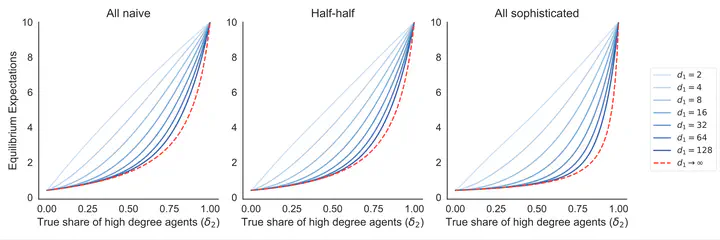Statistical inference in social networks: how sampling bias and uncertainty shape decisions
 Information precision and equilibrium beliefs
Information precision and equilibrium beliefsAbstract: We investigate how individuals form expectations about population behavior using statistical inference based on observations of their social relations. Misperceptions about others’ connectedness and behavior arise from sampling bias stemming from the friendship paradox and uncertainty from small samples. In a game where actions are strategic complements, we characterize the equilibrium and analyze equilibrium behavior. We allow for agent sophistication to account for the sampling bias and demonstrate how sophistication affects the equilibrium. We show how population behavior depends on both sources of misperceptions and illustrate when sampling uncertainty plays a critical role compared to sampling bias.